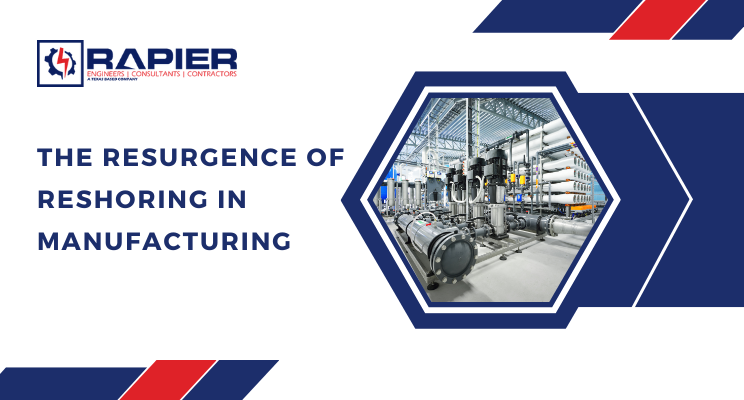Reshoring, the practice of bringing offshore production processes back to domestic facilities, has emerged as a significant trend in manufacturing over the past decade. Recently, reshoring has gained prominence and urgency, driven by lessons from the pandemic and the following uncertainty. As the manufacturing landscape continues to evolve, companies are re-evaluating their global supply chain strategies and recognizing the benefits of reshoring. In this article, we explore the concept of reshoring in manufacturing and why it has become a critical business tactic in building resilience.
Understanding Reshoring
Reshoring involves the relocation of production operations from foreign countries back to the home country of the manufacturer. It shifts away from the offshoring model, where companies sought cost advantages by setting up production in countries with lower labor and operational costs. Reshoring aims to leverage the advantages of local production, including improved quality control, reduced lead times, increased supply chain flexibility, and enhanced responsiveness to market changes.
The global upheaval caused by the COVID-19 pandemic exposed vulnerabilities in global supply chains. Disruptions in transportation, restricted trade, and uncertainties highlighted the risks associated with excessive reliance on offshore production. Manufacturers faced challenges such as extended lead times, inventory shortages, and logistical bottlenecks, ultimately impacting their ability to meet customer demand. As a result, many companies recognized the need to re-evaluate their supply chain strategies and consider reshoring as a means of building resilience.
Benefits of Reshoring:
- Improved Quality Control: By bringing production processes closer to home, manufacturers gain greater control over quality assurance, reducing the risks of defects and product recalls. Proximity to production facilities allows for more effective monitoring and collaboration with suppliers, resulting in higher quality standards.
- Reduced Lead Times: Reshoring minimizes the extended lead times associated with long-distance transportation and customs procedures. Shorter lead times enable manufacturers to respond quickly to market demands, reduce inventory carrying costs, and deliver products to customers faster.
- Supply Chain Flexibility: Local production provides enhanced flexibility in adapting to changing market conditions and customer preferences. Manufacturers can quickly adjust production volumes, introduce product variations, and implement design improvements without extensive coordination with offshore partners.
- Enhanced Intellectual Property Protection: Reshoring can mitigate concerns related to intellectual property theft and counterfeiting. Companies can exercise more control over their proprietary knowledge, manufacturing processes, and trade secrets when production is located within their home country’s legal framework.
- Job Creation and Economic Impact: Reshoring has the potential to stimulate domestic economies by creating new employment opportunities. Bringing manufacturing back home revitalizes local industries, fosters innovation, and contributes to a more sustainable and self-reliant economy.
Challenges of Reshoring
Reshoring is not without its challenges. Companies must carefully evaluate the cost implications, including labor costs, operational expenses, and tax structures. Furthermore, building or expanding domestic manufacturing facilities requires significant investments in infrastructure, technology, and talent development. Collaboration between government, industry, and academia can help by providing incentives, fostering skill programs, and promoting innovation.
Building a Resilient Future through Reshoring
Reshoring in manufacturing has emerged as a critical business tactic in response to the lessons learned from the pandemic and the ongoing uncertainty in the global landscape. By reshoring, companies can enhance supply chain resilience, improve quality control, reduce lead times, and adapt quickly to market changes. While reshoring presents challenges, its benefits in risk mitigation, supply chain flexibility, and economic impact make it a compelling strategy for long-term sustainability. As the manufacturing industry continues to evolve, embracing reshoring can help build a more resilient and prosperous future.


